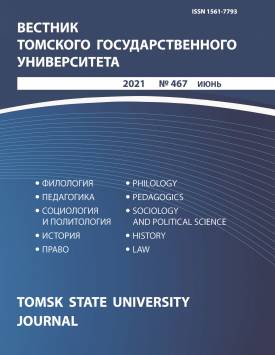Human Capital's Humanitarianization in the Anthropological Approach Context to Education
The essence of the concept “human capital” is analyzed in the context of an anthropological approach. It is emphasized that the humanization of human capital is manifested within the framework of pedagogical anthropology, since the content of education is interpreted as the continuity and basic property of human existence, its reality, cognition of one’s own identity and destiny. The use of an anthropological approach in studies on human capital allows revealing the humanitarian content of human capital and its humanitarian characteristics.
Keywords
human capital,
anthropological approach,
pedagogical anthropology,
education,
humanization of human capital,
humanitarian characteristics of human capitalAuthors
| Tsiguleva Olesya V. | Novosibirsk State Pedagogical University | oltsiguleva@yandex.ru |
| Pozdeeva Svetlana I. | Tomsk State Pedagogical University | svetapozd@mail.ru |
Всего: 2
References
Garanina, O.D. (2009) The human factor in the context of the concept of human potential. Scientific Bulletin of MSTU GA. 142. pp. 76-80. (In Russian).
Kraevsky, V.V. (2006) The human factor in the life of pedagogy. Pedagogy. 3. pp. 92-101. (In Russian).
North, D.C. (1981) Structure and Change in Economic History. New York; London: W.W. Norton & Company.
Malkova, I.Y. et al. (2020) Student’s subjectivity formation: Methodology of research. European Proceedings of Social and Behavioural Sciences. pp. 116-124. DOI: 10.15405/epsbs.2020.10.04.15
Ogurtsov, A.P. & Platonov, V.V. Images of education. Saint Petersburg: RKhGI. (In Russian).
Husserl, E. (2009) Ideas for a Pure Phenomenology and Phenomenological Philosophy. Book 1: General Introduction to Pure Phenomenology. Moscow: Academic project. (In Russian).
Fink, E. (2017) Basic phenomena of human existence. Moscow: Canon. (In Russian).
Vidgof, V.M. (1998) Philosophical and cultural aspect of pedagogical anthropology. Modern pedagogical anthropology in systems of lifelong education. Proceedings of the Seminar. Tomsk: Tomsk State University. pp. 3-10. (In Russian).
Klochko V.E. & Galazhinsky, E.V. (1999) Self-realization of personality: a systemic view. Tomsk: Tomsk State University. (In Russian).
Slobodchikov, V.I. & Isaev, E.I. (1998) Anthropological principle in developmental psychology. Questions of Psychology. 6. pp. 3-17. (In Russian).
Pozdeeva, S.I. (2017) Practice of School of Collaboration as an educational innovation: changes in the content and results of education. In: Pozdeeva, S.I. (ed.) Potential research and management concept educational innovations of G.N. Prozumentova in solving problems of education development. Tomsk: Tomsk State University. pp. 81-88. (In Russian).
Gusinsky, E.N. & Turchaninov Yu.I. (2000) Introduction to the philosophy of education. Mosccow: Logos. (In Russian).
Prozumentova, G.N. (2005) Strategy and program of humanitarian research of educational innovations. In: Prozumentova, G.N. (ed.) Transition to an open educational space. Part 1: The phenomenology of educational innovations. Tomsk: Tomsk State University. pp. 15-105. (In Russian).
Mazur, L.N. (2020) Human capital as an object of historical research. Human Capital. 11 (143). pp. 34-39. (In Russian). DOI: 10.25629/HC.2020.11.02
Tsiguleva, O.V. (2019) Human capital’s essence and content in the psychological sciences. Socio-cultural problems of a modern human. Conference Proceedings. Novosibirsk: Novosibirsk State Pedagogical University. pp. 20-26. (In Russian).

